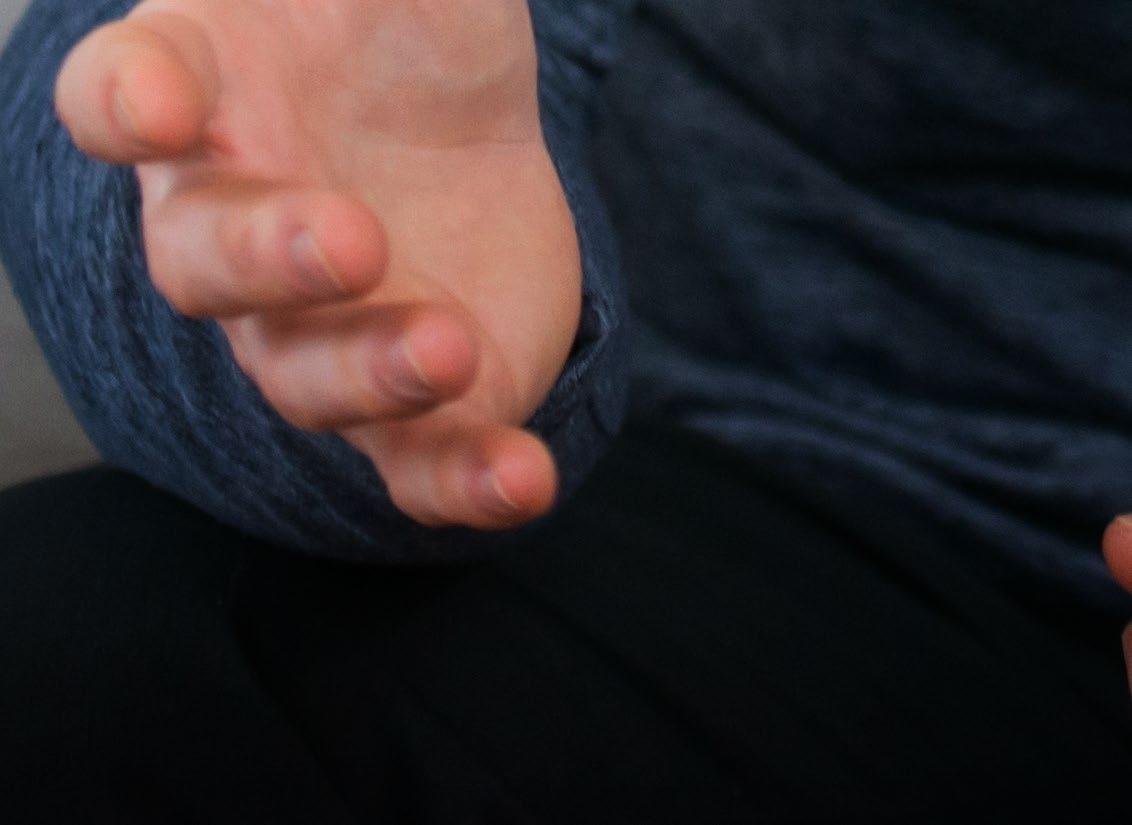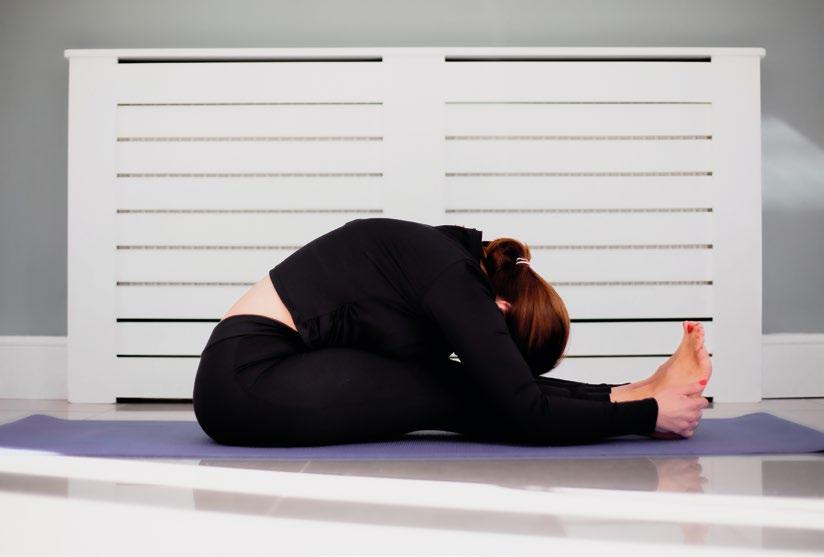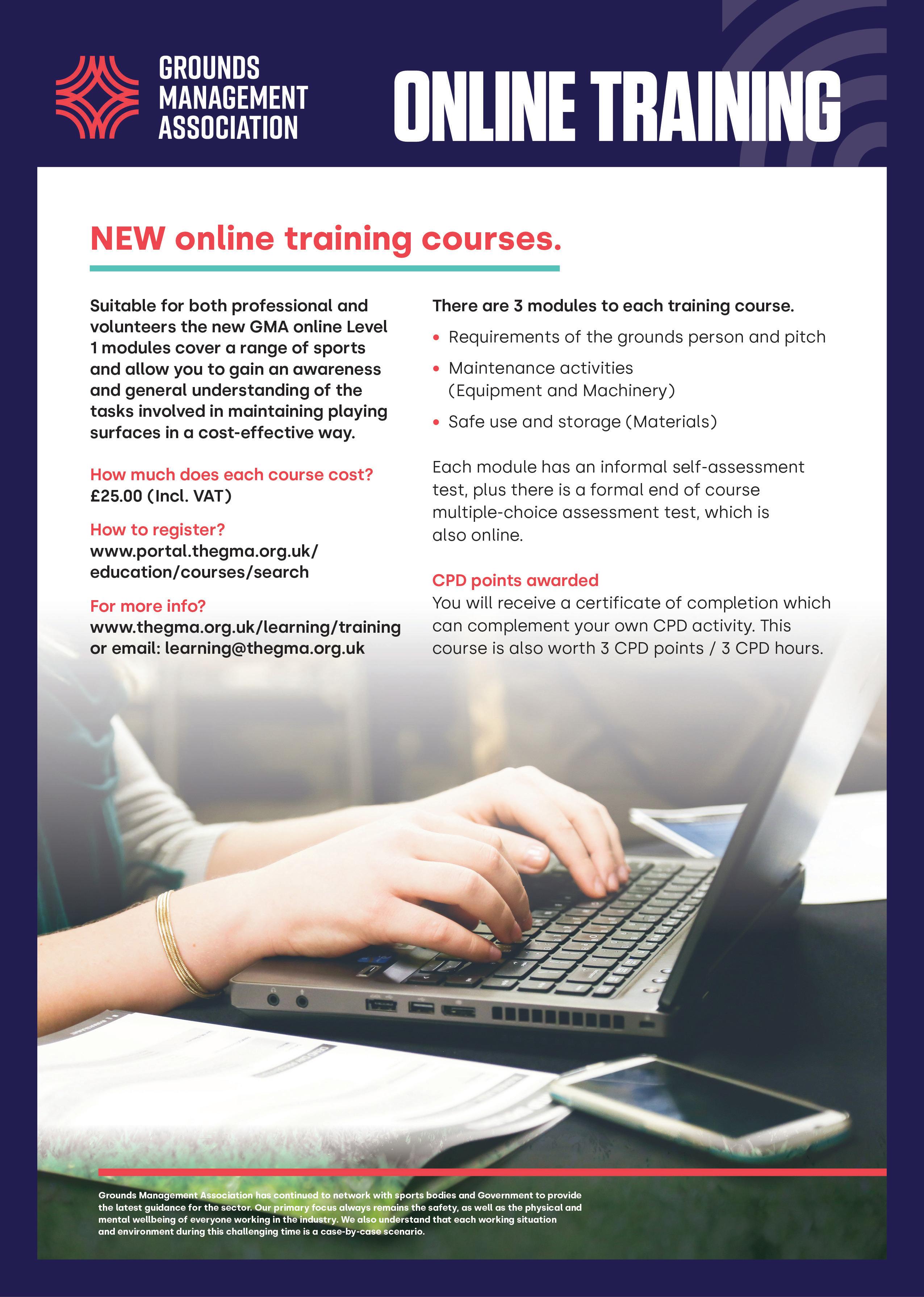
7 minute read
Help is at hand
Andy Carmichael Freelance writer



In the second of our mental health series, we look at where you and your colleagues can get help with your mental wellbeing


IN LAST MONTH’S ISSUE we featured the need to talk about mental health in the grounds industry with Karl Standley, grounds manager at Wembley National Stadium, sharing an open and honest description of his wellbeing challenge. This month we highlight just some of the available sources of advice and help. These cover different perspectives as we, as individuals, may feel more comfortable with one route over another. But one thing is clear: there is a lot of help available.


The Mental Health Foundation
The Mental Health Foundation is a charity that emphasises “prevention is at the heart of our work”. Stress and anxiety are two symptoms of a decline in mental health, says the foundation.
Stress is a feeling of being under abnormal pressure. When you are in certain situations, your body creates a stress response and releases hormones producing physical changes. You may be familiar with the concept of ‘fight or flight’ responses as blood pressure, heart rate and sweating increase. When experienced briefly, there may be some benefit towards performance. However, excessive or persistent stress can not only result in mental health problems but also in physical decline, including heart attacks. More generally, you might start having headaches, nausea, dizziness, sleep problems and other such disorders. Emotions may become more intense and lead to mood swings.
People react differently to stress and it is important to tackle it early. The foundation suggests various steps: • Realise when it is causing you a problem and do not ignore warning signs • Identify the causes – are some within your power and others not? • Review your lifestyle – can you make changes?
Anxiety describes fears of things that may happen, not what is happening. Worrying about the outcomes may stop you from acting when you need or want to and, consequently, the anxiety worsens. Try to understand the fear and deal with it in small steps, perhaps using a diary to note when and what makes you anxious, or list things that help reduce the concern or physical objects that put you in a more positive frame of mind.
Some people utilise complementary therapies, exercises or relaxation techniques to reduce anxiety. Faith may be important to some and talking therapies may be of benefit.
The Mental Health Foundation produces guides highlighting factors relevant to our emotional wellbeing that we may be able to change, including Talking, Keeping Active, Eating well and Drinking alcohol sensibly.
www.mentalhealth.org.uk Ell&Dee
Consultancy Ell&Dee works with people and organisations to change their thinking and help them with their mental health. Founder Claire Morton highlights how our lives have become so busy and the number of thoughts we have can be overwhelming – which leads some of us to end up “living on our nerves, fears, worries and limiting beliefs”. For her it is about taking time out from these routines. “It’s about finding other ways, helpful ways, to quieten the mind.”
Claire knows it is not easy for everyone; “it’s scary for people to not be doing things”, she adds. By slowing down and taking time to reflect, she says we can focus on what we really want, how we want to live our lives, and how we are going to start making the choices that lead us to a calmer and more peaceful place. Rather than the negative mindset that sees us reliving past issues, or worrying about what may come, Claire suggests we teach ourselves how to look at what is here now, to be able to connect to the ‘present moment’, as the present moment is all we have. She suggests there are ways we can achieve this; through meditation, focusing on our breath and by choosing at least three positive things we can find to be grateful for at the end of each day.
She also advocates physical exercise, through her role as a yoga teacher. Dispelling some of the myths associated with the practice, she laughs “it isn’t a spiritual woo, woo thing”, as evidenced by the many professional sports people, neuroscientists and growing number of people in the western world advocating its benefits.
Aware of the challenges that some men particularly have with this issue, Claire has created The Purpose Pusher Project, a free-tojoin Facebook group that allows participants to “share a safe space for personal development and growth”. She hopes it will allow individuals to reach out and provide those who have found a good state of mental health a chance to offer support and inspiration.
www.ellanddee.com www.facebook.com/purposepusherproject


Perennial and Big White Wall
The charity Perennial has been helping people involved in horticulture for over 180 years. It offers free and confidential advice, support and financial assistance to people of all ages working in, or retired from, the sector.
Perennial emphasises the need for action before a situation deteriorates. Whether it be personal or employment concerns, health or monetary challenges, it encourages people to get in touch as soon as a problem is evident and avoid it becoming a crisis. It says that one in four people in horticulture experience problems at some point.
“Often when we help people, we’ve been downstream – someone’s fallen in and we’ve dragged them out and helped them,” says director of marketing and fundraising Anita Bates. “What we want to do is to get upstream and stop them falling in, so this year we are launching new services aimed at preventing people getting into difficulty in the first place. One is our partnership with the Big White Wall.”
Big White Wall provides online support in a safe and supportive environment, an anonymous community of members and professionals offering advice and support 24 hours a day. People have access to a variety of content, tests and tools that help them understand how they are feeling, with techniques to help get them on the road to recovery. The services available include: • A discussion wall to tell your story, or listen to what others in the community are saying, and get professional support • A self-assessment to get a better understanding of how you’re feeling • Online self-guided mental wellbeing programmes to help you to manage a variety of mental health difficulties.
A short, anonymous questionnaire provides access (www.perennial.org.uk/home/ways-wecan-help/big-white-wall/); alternatively, if you need help or know someone who does, contact Perennial on 0800 093 8543 or visit
www.perennial.org.uk

Mental Health First Aid (MHFA) England
“Mental Health First Aid (MHFA) is the mental health equivalent of physical first aid,” says Vicki Cockman, workplace lead at MHFA England. “It gives people the skills and confidence to recognise the signs of common mental health issues and guides them towards the right support, be that self-help information, an Employee Assistance Programme or professional services.
“As a social enterprise, MHFA England offers expert guidance and training, both online and face to face, to support mental health in the workplace and beyond. We’ve worked with over 20,000 organisations of all sizes across sectors and seen up to a 75% reduction in mental healthrelated sickness absence in the workplace.
“Our mission is to create an unshakable belief that we can all talk freely about mental health and seek support when we need it, and that mental health should be of equal importance to physical health. So far, our Instructor Member community has trained one in 70 adults in England in vital mental health awareness and skills.
“As the sporting season restarts and workplaces begin to physically re-open, it’s vital employers can support the wellbeing of the many who will have concerns about returning to work. By spotting signs early, promoting self-care and signposting to further support, Mental Health First Aiders can help ease this transition.
“With the Centre for Mental Health estimating that half a million more people than average are experiencing mental ill health in the wake of the pandemic, we believe our work is more important than ever. We hope our work will help more people access the right support at the right time.” www.mhfaengland.org ■
The Grounds Management Association does not seek to judge, promote or advocate one route of help and advice over another, but it is clear from our contributors that the important thing is that we act – that we talk to someone and we begin the process of managing our mental health. Too many people are struggling and they should know they are not alone. www.thegma.org.uk/guidanceyour-health-and-wellbeing










